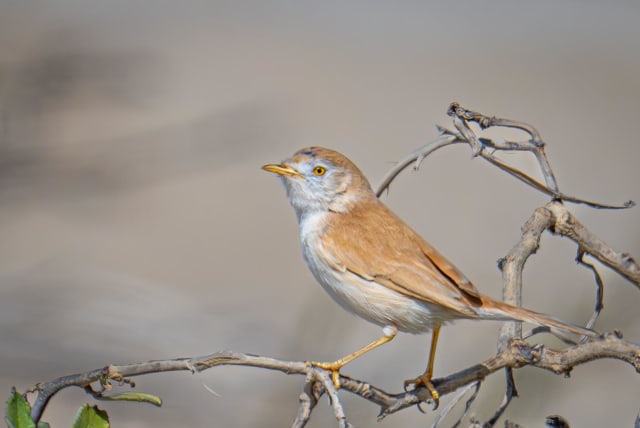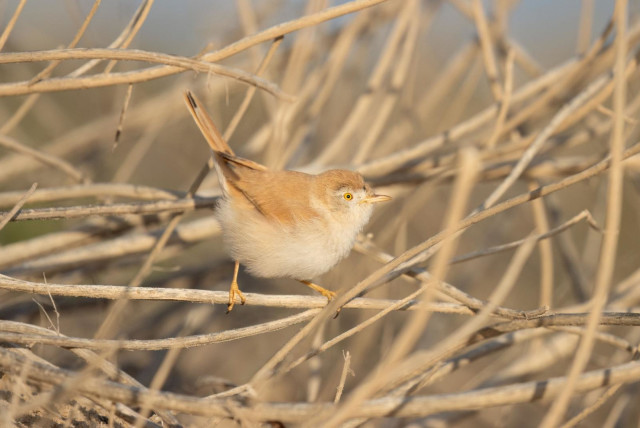Rare African warbler spotted on Haifa beach

The African desert warbler, or Curruca deserti, is a small songbird typically found in northwest Africa. This was the second known sighting in Israel, after a first in 2013.
Birdwatcher Sagi Shuel spotted a rare visitor at Haifa’s Student Beach on Saturday: an African desert warbler, a songbird from northwest Africa that has only been reported in Israel once before.
Shuel immediately identified the bird before writing in a post online, “I had never seen the species, but I remembered from the bird guide that this one is bright and sandy and that its identifying feature is a yellowish eye.” The birdwatcher managed to snap a few photos, which he shared with a WhatsApp group, where colleagues confirmed his assessment.
The African desert warbler, or Curruca deserti, is a small songbird typically found in Morocco, western Libya, southern Mali, and Mauritania, according to the Birdwatching Center of Israel website. Its only other sighting in Israel was also in Haifa, just over a decade ago, in 2013.
The species is occasionally sighted in southern Europe— seen by birders in Spain, Italy, and Malta from time to time— but the two sightings in Israel are its only confirmed appearances in the eastern Mediterranean Basin.
That a migrant bird in this neighborhood would land specifically in Haifa is not surprising. A study conducted a few years ago by the Nature Surveys Unit of the Society for the Protection of Nature in Israel (SPNI) found that the area between Haifa and Tirat Carmel is rich in protected species.
March is peak migration season in Israel
“On the coast of the Mediterranean Sea, there are almost no areas left in their natural state,” said Dr. Yoav Perlman, director of the SPNI’s Israel Ornithological Society. “So the few remaining areas, such as the sand dunes south of Haifa where the warbler is, are very important. Our region is experiencing peak migration season right now, and migrating species make stops along their way in Israel to rest and gather energy for the long trip still ahead of them."
“Due to the enormous challenges that migratory birds experience along their routes,” Perlman added, “including habitat destruction, climate change, and hunting, it's particularly important to maintain high-quality and rich stopping points in Israel.”
The Environment and Climate Change portal is produced in cooperation with the Goldman Sonnenfeldt School of Sustainability and Climate Change at Ben-Gurion University of the Negev. The Jerusalem Post maintains all editorial decisions related to the content.
Jerusalem Post Store
`; document.getElementById("linkPremium").innerHTML = cont; var divWithLink = document.getElementById("premium-link"); if (divWithLink !== null && divWithLink !== 'undefined') { divWithLink.style.border = "solid 1px #cb0f3e"; divWithLink.style.textAlign = "center"; divWithLink.style.marginBottom = "15px"; divWithLink.style.marginTop = "15px"; divWithLink.style.width = "100%"; divWithLink.style.backgroundColor = "#122952"; divWithLink.style.color = "#ffffff"; divWithLink.style.lineHeight = "1.5"; } } (function (v, i) { });

